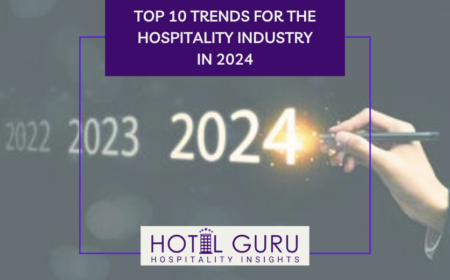The Good and the Not So Good for Hospitality Halfway Through 2023
Hotel Demand Will Continue To Accelerate
By Robert Rauch
Original Article on HNN can be found HERE
At the beginning of this decade, the lodging industry experienced a significant recession triggered by the lockdown measures implemented in March 2020.
These measures resulted in the closure of attractions, numerous hotels, and a virtual halt to travel in the United States and abroad. Now, let’s examine how the post-lockdown environment is affecting the economy.
Unemployment rates have significantly decreased and currently stand at approximately 3.5%. Additionally, the banking crisis that caused market concerns early in the second quarter of 2023 seems to be contained or under control. According to CBRE, the forecast for the gross domestic product indicates it will remain around 1.5% for the remainder of this year and throughout 2024.
Inflation, as measured by the Consumer Price Index, has been consistently higher than the long-term average of 2.8% for the past three years. This inflationary pressure has resulted in a 24% increase in wage rates over the same three-year period. While average hotel rates have experienced significant growth, reaching the high teens at 18% or more, the real revenue per available room has not yet kept pace with the rate of inflation.
The Good News
Demand will accelerate for several reasons. First, leisure business continues to do well, corporate and groups are growing toward 2019 levels, and international travel is just beginning to come back. Average rates are up in all sectors: leisure, corporate negotiated and group. We do not see rate resistance yet, and all signals are good for RevPAR acceleration. Consumer confidence is up for the seventh straight month and Google search travel trends are back at 2019 levels. International travel is coming back with the restrictions easing, even in Japan and China.
Not as Good
We don’t see much movement in occupancy going forward. It doesn’t benefit us to take any more business; we are better off charging more as demand accelerates in the third quarter. Finding a good labor force, especially in housekeeping, continues to be a work in progress. Training new hires is tougher now than ever before as management teams are new due to the impact of the lockdown. These managers are training supervisors who have never managed others before as they were promoted from line positions recently. It is almost like the blind leading the blind, which creates opportunities for daily mistakes, apologies to guests, refunds or discounts and organized chaos.
Not So Good
While travel is a birthright in the mind of most Americans, inflation, interest rates and construction costs are certainly headwinds. Costs of food, energy, insurance and labor are at all-time highs with no sign of slowing. These costs are up an average of 10% over last year, and those costs were up over 10% over 2021.
Interest rates are making it difficult to refinance. If there is good news here, it is that no new supply will be the mantra as getting a construction loan now is as difficult as it has been in years. This is partly due to interest rates as well as the collapse of Silicon Valley Bank, Signature Bank and a few others. So, it is good news for operators, bad news for those trying to break ground.
Office occupancy rates are at historic lows, and that continues to be a headwind for corporate demand. Housing and mortgage prices are up, and wages are up 24% in the past three years. The second quarter is softer, but we continue to see an improved market in all sectors of lodging.
Bank Debt
Banks’ appetite for hotel financing is much less than back in 2019. Construction loans are at 8%-plus. and existing hotel acquisitions are being financed at closer to 7%. The landscape is better suited for conversions since that involves an asset with stable cash flow. There is private equity out there, and while it is not cheap, it offers slightly better leverage than the 50% to 55% that a bank will fund. Banks still prefer to finance projects for major brands such as Hilton, Marriott and IHG, because of their robust reservations and awards systems, but there is still interest in financing independent hotels in more urban areas.
Forecast
Air, hotel, online travel agencies, cruise lines and short-term rentals are all finally above 2019. April had some budget misses, leisure is flat, group and corporate are still coming back and RevPAR should be up over 5% both in 2023 and 2024. Naturally, every macro and micro market is different. In San Diego, we work closely with the San Diego Tourism Authority and the San Diego County Lodging Association to produce an annual detailed submarket forecast. We have also worked with Visit Phoenix to produce similar works in conjunction with the Phoenix Area Revenue Managers.
Stay focused — all will be good through the 2024 elections for now!
Robert A. Rauch is founder of R.A. Rauch & Associates, a hospitality management and consulting firm based in San Diego.







